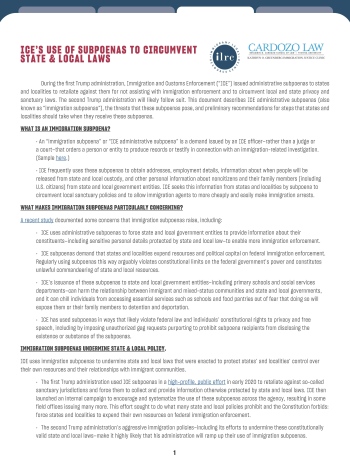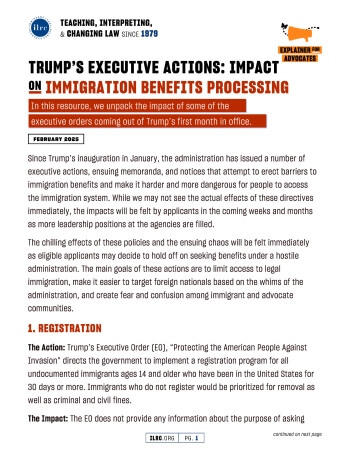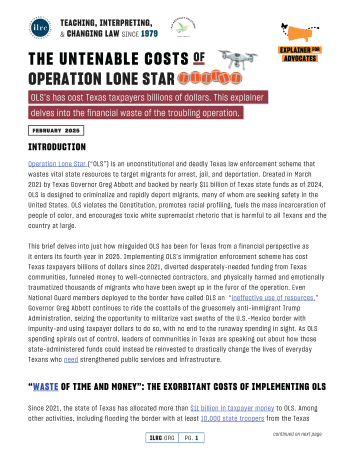The Department of Homeland Security (DHS) is proposing to change several forms by adding questions about an applicants’ family members, old email addresses and phone numbers and social media account information. The collection of information goes far beyond what the government needs to adjudicate these applications. The information in this resource discusses what the changes are and how to submit a comment.

A primer on how ICE uses administrative subpoenas to circumvent local sanctuary laws, from the Benjamin N. Cardozo School of Law and ILRC. This brief explainer discusses the nature of ICE subpoenas, how they are used, and the legal issues involved.
Permanent residents have many rights and benefits.
Permission to live and work in the United States
Eligibility for certain public benefits
Right to travel within the United States and abroad
Your green card is proof of your status. If you lose it or it expires, you are still a permanent resident. Permanent Residence is a status—only an immigration judge can take away your permanent residence. Permanent residents should carry their green card (or at a minimum a copy of it).
Permission to live and work in the United States
Eligibility for certain public benefits
Right to travel within the United States and abroad
Your green card is proof of your status. If you lose it or it expires, you are still a permanent resident. Permanent Residence is a status—only an immigration judge can take away your permanent residence. Permanent residents should carry their green card (or at a minimum a copy of it).
Many people who were granted parole to enter the United States, or received a parole document at or after entry, are receiving notices saying that their parole status, and any work permit related to it, is being terminated.
While the notice says you should depart immediately, you may be entitled to pursue applications for immigration benefits or the right to stay. Many people who have already filed applications or are in court have permission to remain in the U.S. while those cases are pending. In some instances, these notices were issued in error. If you have received this notice, you should speak to a trusted immigration legal services provider about your options.
On April 14, 2025, a federal judge blocked the termination of parole for those that came under a parole program from Cuba, Haiti, Nicaragua, or Venezuela, for those whose parole was terminated with a general notice without any reasons that are specific to your case. If you fit this category and received a generic notification by email or through your USCIS online account, your parole remains valid. If you are not sure whether you fit this category, speak with a trusted legal services provider. Stay in touch with a trusted legal organization, there will be updates.
While the notice says you should depart immediately, you may be entitled to pursue applications for immigration benefits or the right to stay. Many people who have already filed applications or are in court have permission to remain in the U.S. while those cases are pending. In some instances, these notices were issued in error. If you have received this notice, you should speak to a trusted immigration legal services provider about your options.
On April 14, 2025, a federal judge blocked the termination of parole for those that came under a parole program from Cuba, Haiti, Nicaragua, or Venezuela, for those whose parole was terminated with a general notice without any reasons that are specific to your case. If you fit this category and received a generic notification by email or through your USCIS online account, your parole remains valid. If you are not sure whether you fit this category, speak with a trusted legal services provider. Stay in touch with a trusted legal organization, there will be updates.
The Trump administration’s Registration requirement for most undocumented immigrants is another hateful tactic in its campaign to cause panic and fear throughout the country. The Department of Homeland Security (DHS) has been clear that the central purpose of Registration is to gather information about all noncitizens and use this information to locate, apprehend and remove them as quickly as possible. The new registration requirement took effect April 11, 2025.
The Trump Administration is rapidly expanding the 287(g) immigration enforcement program. This program worsens police discrimination and increases the risk of arrest, detention, and deportation for immigrants living in or traveling in places that participate in the 287(g) program.
The Trump administration has ordered the prioritization of federal prosecutions for immigration-related offenses, including for simply entering the United States or reentering after removal without permission. Congress is considering budget proposals with hundreds of billions of dollars for border and immigration enforcement, including billions that would fund a dramatic increase in federal criminal prosecutions for immigration offenses. At the same time, some in Congress are again proposing legislation that would fuel mass incarceration by increasing penalties for those charged criminally for unauthorized reentry into the United States. This explainer describes how the budget proposals currently in Congress would fund mass prosecutions that have already had a deadly and costly impact over the years. It also explains how the proposed legislation would line the pockets of the private prison industry with enormous cost to taxpayers.

In its first month, the Trump administration has issued dozens of executive orders (EO) that seek to limit access to the immigration system, target foreign nationals for political gain and sow chaos and fear among immigrant and advocate communities. This explainer focuses on aspects of the EOs that target immigration benefits, processing and adjudication.
On January 17th, 2025, the Fifth Circuit Court of Appeals (“Court”) issued its latest decision in the ongoing DACA litigation. While nothing has changed, and current DACA recipients can continue to renew their DACA and obtain both protection from deportation and work authorization, it is important to understand what the current state of DACA is and what can change in the future.

Operation Lone Star (OLS) is an unconstitutional and deadly Texas law enforcement scheme that wastes vital state resources to target migrants for arrest, jail, and deportation. To date, nearly $11 billion has been spent on OLS. This policy brief delves into how misguided OLS has been for Texans from a financial perspective and provides recommendations for how OLS funds could be reinvested to support the everyday lives of Texans who need strengthened public services and infrastructure.